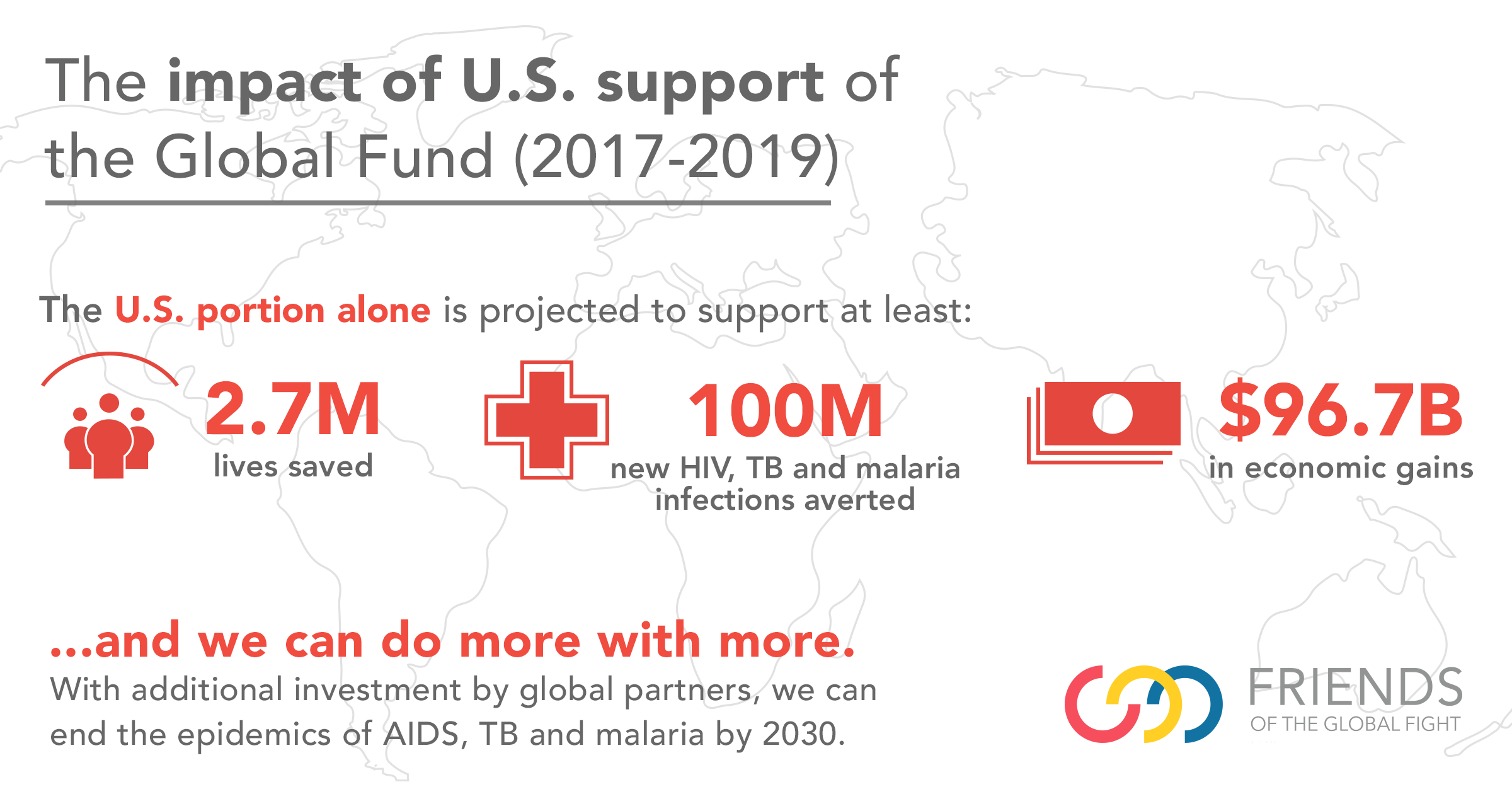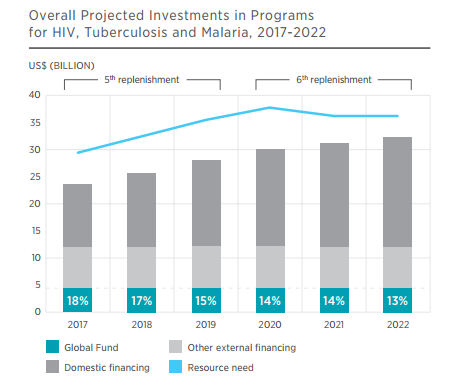September 26, 2016
The United States has shown strong leadership in the fight against HIV/AIDS, tuberculosis (TB), malaria and global health more generally, investing $13.2 billion to the Global Fund as of September 2016. Most recently, the U.S. pledged up to $4.3 billion to the launch of the Global Fund’s Fifth Replenishment for 2017-2019, which makes up nearly one-third of the total $12.9 billion pledged collectively by countries and the private sector over the next three years. The Global Fund Investment Case clearly outlines how this nearly $13 billion will save 8 million lives, avert 300 million infections, help build resilient and sustainable systems for health, and lead to broad economic gains of up to $290 billion. The U.S. portion of this investment alone is projected to save 2.7 million lives, avert 100 new infections, and develop health infrastructure that is undeniably and vitally necessary to end these global epidemics, ensure equal access, and improve overall health for people worldwide.

While the U.S. and other donor countries have provided robust and steady support since the Global Fund was founded in 2002, the private sector is increasingly making its mark on HIV/AIDS, TB and malaria, as well as health systems globally. Involvement by U.S. private sector leaders is key to innovation in technology, medicine, and health service delivery. The private sector (including innovative financing mechanisms) doubled its pledge for the Global Fund’s Fifth Replenishment, reaching a total of $250 million for the next three years. Prior to this announcement, the private sector played a pivotal role, committing nearly $2 billion to the Global Fund since 2003. The Bill & Melinda Gates Foundation and U.S.-based companies like Coca-Cola, Chevron, and PRODUCT (RED) are among the top private organizations investing in the fight against HIV/AIDS, TB and malaria. Reflecting the private sector’s investment and passion for the Global Fund, Bill Gates said “the commitments we are making in Montreal [to the Global Fund], even in hard times, show we still care and are willing to create a more prosperous and secure world for people everywhere”.
The roles that private sector partners play for the Global Fund range from developing alternative funding mechanisms to sharing their knowledge and technical expertise to ensure that grants run by partners can be most effectively and efficiently implemented.

Coca-Cola Lead Cooler Technician, Maxwell Ayisi (right), and Ghana Health Service Refrigeration Technician, Livingstone Modey, repairing a dual gas/ electric vaccine refrigerator at a clinic in Peki Dzake, Ghana. Image by The Coca-Cola Company
The Atlanta-based Coca-Cola company realized their niche and ability to transform lives by asking themselves this question: If we can get a can of Coke to the furthest places in the world, why can’t we get vaccines there? Coca-Cola’s public-private partnership with the Global Fund is based on the slogan “sharing skills, saving lives.” Coca-Cola has the distribution and supply management skills to make a difference and they used these skills in 2010 to pilot “Project Last Mile” in Tanzania by partnering with the Global Fund, USAID and The Bill and Melinda Gates Foundation. By utilizing already existing experts in the supply chain, local employees were able to train their friends and neighbors on how to effectively and efficiently get the medicines and vaccines to populations that need them the most. In 2014 the partners committed to investing more than $21 million and significant in-kind resources to bring Project Last Mile to 10 African countries by 2020. Investments in projects like Project Last Mile from the private sector will be crucial to closing the gap and ending HIV/AIDS, tuberculosis and malaria. Investments like these can revitalize health systems to tackle these epidemics and other health challenges such as Ebola and Zika. More private industries can and should be following in these footsteps to expand U.S. leadership in saving millions of lives globally.

While the U.S. and other donor countries have increased their pledges significantly and developing countries are coming to the table, with a number of African countries stepping up their investments to the Global Fund and $41 billion projected in domestic financing for 2017-2019, there is still more to be done. Optimistic analysis shows that $13 billion for the Global Fund in addition to domestic growth and donors sustaining commitment levels would only reach 80 percent of the total need projected by partners. The total that is needed to end these epidemics by 2030 is $97 billion. As we celebrate the great outcome from Replenishment is also important to 1) hold countries and the private sector responsible for pledges and 2) to set agenda for closing the funding gap.
Please join Friends of the Global Fight, Malaria No More, and Nothing But Nets for a “Future of Global Health Financing” event on Oct. 6.
